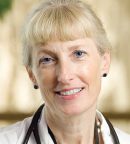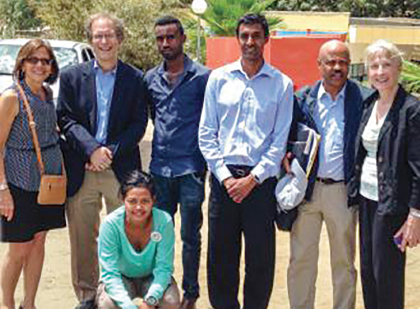
Joanne E. Mortimer, MD
Ethiopia, similar to other African countries, has a significant shortage of physicians. Currently, there are 0.3 physicians for every 100,000 people, a rate that is substantially lower than the 2 physicians per 100,000 people found in the rest of Africa. This year, the First Lady of Ethiopia, Roman Tesfaye, will launch a cancer control plan that will focus on prevention, early detection, palliative care, and improved access to cancer care throughout the country. The First Lady’s plan is especially ambitious given the small number of trained oncologists and limited resources within Ethiopia. Four medical oncologists and a single cobalt machine provide the oncology care for a population of almost 100 million people. These four oncologists and the one radiation facility are located in the capital of Addis Ababa and are not readily accessible to the majority of the Ethiopian population, who live in small and distant villages where the tribal healer is generally consulted first. It is no surprise that much of the oncology care in Ethiopia, including the administration of chemotherapy, is provided by primary care physicians.
Joanne E. Mortimer, MD
Institution: Medical oncologist, Vice Chair and Professor of the Department of Medical Oncology and Therapeutics at City of Hope; Director, City of Hope’s Women’s Cancers Program
ASCO Member Since: 1983
ASCO Activities: Test Materials Development Committee (TMDC); Past Chair of the Oncology Training Program Geriatric Oncology Training Subcommittee and Oncology Training Programs Committee
ASCO sponsored a multidisciplinary team that traveled to Gondar and Hawassa on March 7–12, 2016, to provide educational programs for these primary care physicians and for medical students as part of the Cancer Control in Primary Care course. The team, which included Annette Galassi, RN, MA; Kenneth D. Miller, MD; Emebet Kassa, PharmD; Doug Pyle; and myself, conducted 3 days of lectures that focused on the common cancers diagnosed in Ethiopia, as well as the safe mixing and administration of chemotherapy.
Teaching Oncology Basics in a Low-Resource Setting
The medical school in Gondar is the oldest in the country. Here, oncology care is provided by 2 primary care physicians with a single outpatient exam room adjacent to a 10-bed hospital/chemotherapy facility; the facility is located between two freestanding buildings, one of which provides care for tuberculosis and the other for leishmaniasis.
In both Gondar and Hawassa, the ASCO team began the 3-day Cancer Control in Primary Care course with an “Introduction to Oncology” lecture for medical students. This lecture was followed by didactic sessions for practicing internists, pediatricians, and surgeons and addressed prevention, screening, and early detection of cervical and breast cancers, as well as palliative care. Smaller interactive breakout groups focused on the unique cultural and practical challenges of providing quality cancer care to the population of patients with cancer in Ethiopia. For example, the country has no long-acting opioids available for managing pain, and there is reticence around using short-acting morphine. The mainstay of cancer pain management is paracetamol (acetaminophen) and ketorolac.
The final day of the course provided hands-on training in the safe mixing and handling of chemotherapy for nurses and pharmacists. In the absence of ventilation hoods, the pharmacists have improvised a protective mixing area using a discarded neonatal incubator.
The Opportunity to Teach at a Growing Cancer Center in Hawassa
Six years ago, Carol Harris, MD, an infectious disease specialist at Albert Einstein School of Medicine, was asked to craft an oncology program at the Hawassa University College of Medicine and Health Sciences as part of a multifaceted collaboration between that medical school in southern Ethiopia and Einstein. The Hawassa University College of Medicine and Health Sciences embraced the idea of a breast cancer treatment facility as a starting point. Inaugurated in March 2013, the breast cancer center now provides diagnostic testing, surgery, and chemotherapy. A nurse coordinator helps patients navigate their care. As the program expands to include other primary tumor sites, the breast cancer program will serve as the model for multidisciplinary cancer care in Ethiopia. This year, the school will break ground for a new cancer center that will include a radiation facility.

Local course organizers and faculty of the Cancer Control in Primary Care course in Ethiopia (left to right): Annette Galassi, Dr. Kenneth D. Miller, Dr. Ephrem Tafesse, Dr. Ermias Diro Ejara, Dr. Emebet Kassa, Dr. Joanne Mortimer, and Haimanot Kasahun Alemu (front).
The educational program in Hawassa covered the same oncologic topics as in Gondar and, similarly, was tailored to medical students, nurses, and health officers. In appreciation of the need for a larger medical workforce, the Ethiopian government recently expanded the number of medical students fourfold, and this large increase in students was noticeable at the Hawassa University College of Medicine and Health Sciences. It was a challenge to provide individualized teaching to all the students, but all attendees were able to participate in chemotherapy calculations and came to appreciate the importance of the multidisciplinary approach to cancer. The students especially enjoyed learning to perform and teach breast cancer awareness using breast models.
It is clear that Ethiopia has made comprehensive cancer care a priority. The ASCO International educational programs provided a unique opportunity to interact with students and physicians and to help generate excitement about careers in oncology. ■
Originally printed in ASCO Connection. © American Society of Clinical Oncology. “ASCO International Course Helps Ethiopia Realize Its Goal of Improving Cancer Care.” ASCO Connection, July 2016: 34-35. All rights reserved.

